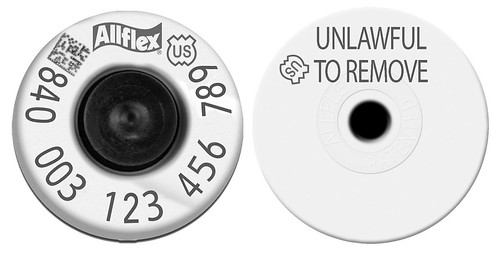New animal identification requirements now in effect
(456 words)
By Carol Sanders
PINE BLUFF, Ark. – A new animal identification numbering system took effect March 11, said David Fernandez, Cooperative Extension Program livestock specialist at the University of Arkansas at Pine Bluff.
The National Animal Disease Traceability Program went into effect March 2013, but many producers still had ID tags based on the former system on hand. The U.S. Department of Agriculture then established a two-year grace period to allow producers to use the old 900 or USA tags until March 11, 2015.
“Now, those producers who were using the old tags should only tag animals with the new 840 tags,” Fernandez said. “Animals tagged before March 11, 2015, do not need to be tagged with the new 840 tag. The old tag will be recognized as official for the life of the animal.”
Animals already enrolled in a national health program, such as the brucellosis program for cattle or scrapie program for sheep and goats, do not need an additional tag, Fernandez said. Also, breed registry identification tattoos and state-registered brands will be accepted.
The identification system does not apply to feeder calves unless they are being used temporarily as rodeo stock. Feeder calf rules are being formulated and will be released for public comment before they go into effect, he says. Rodeo stock must be identified under the rules of the Traceability Program.
Fernandez reminds producers that the rules only apply to animals moving across state or tribal boundaries. As long as producers’ animals remain within the state, they need only comply with the rules set by the Arkansas Livestock and Poultry Commission
(http://www.aad.arkansas.gov/Websites/aad/files/Content/5937242/Entry_Regulations_.pdf ) which primarily involve animals entering the state. The ALPC has created a voluntary premise ID system that will allow producers to comply with the national ID system http://www.aad.arkansas.gov/regulations ).
“If shipping animals out of state, be sure to check with the governing body of the state(s) across which or into which you are shipping animals,” he advises.
For more information about the National Animal Disease Traceability Program, go to www.aphis.usda.gov and click on the Animal Health link. Then, click on the Traceability link.
A number of different companies manufacture the tags, so producers should be able to use equipment already on hand to apply the new tags. For more information on this or other livestock related topics, contact Dr. Fernandez at (870) 575-7214 or fernandezd@uapb.edu.
Pursuant to 7 CFR § 15.3, the University of Arkansas System Division of Agriculture offers all its Extension and Research programs and services (including employment) without regard to race, color, sex, national origin, religion, age, disability, marital or veteran status, genetic information, sexual preference, pregnancy or any other legally protected status, and is an equal opportunity institution.
# # #
Media Contact: Carol Sanders
Writer/Editor
UAPB School of Agriculture, Fisheries and Human Sciences
Cooperative Extension Program
(870) 575-7238
sandersc@uapb.edu
Related Links
